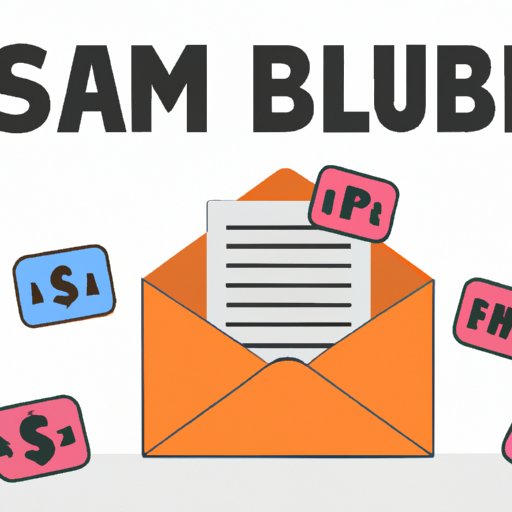Introduction
Bitcoin has become increasingly popular in recent years, and unfortunately, this also means it is subject to malicious activities such as spam emails. Bitcoin spam emails are unsolicited messages sent out to a large number of recipients offering some kind of “opportunity” involving the digital currency. In reality, these “opportunities” can be nothing more than scams or attempts to steal personal information.
In order to protect yourself from bitcoin spam emails, it is important to understand the problem and have a plan of action in place. This article provides a comprehensive guide on how to stop bitcoin spam emails, including how to install a spam filter, block sender addresses, unsubscribe from suspect emails, set up an email whitelist, report bitcoin spam to your ISP, and use a separate email address for online transactions.
Install a Spam Filter
The first step to stopping bitcoin spam emails is to install a spam filter. A spam filter is a program that checks incoming emails and filters out any messages that match certain criteria. These criteria can be based on the content of the message, the sender, or even the recipient. By installing a spam filter, you can drastically reduce the amount of bitcoin spam emails you receive.
Installing a spam filter is relatively straightforward. Most webmail services such as Gmail and Outlook already have built-in spam filters, so all you need to do is enable them. Additionally, there are many third-party spam filters available that can be installed on your computer or server. Whichever method you choose, make sure to configure the settings according to your preferences.
By installing a spam filter, you can ensure that only legitimate emails make it through to your inbox. This will save you time by eliminating the need to manually sort through and delete unwanted emails, and it will also help to protect your personal data from falling into the wrong hands.
Block Sender Addresses
Once you have installed a spam filter, you can take further steps to protect yourself from bitcoin spam emails by blocking specific sender addresses. Blocking sender addresses is a simple process that allows you to prevent emails from certain senders from reaching your inbox. This can be especially useful if you have received multiple emails from the same sender.
To block a sender address, you must first find the sender’s email address. This can usually be found in the email header, which is accessible by clicking the “show details” button in most email clients. Once you have located the sender’s email address, you can then add it to your spam filter’s list of blocked senders. This will ensure that any emails from that sender will be automatically filtered out.
Unsubscribe from Suspect Emails
Another way to stop bitcoin spam emails is to unsubscribe from suspect emails. If you receive an email that appears suspicious, it is best to unsubscribe immediately. This will help to prevent any future emails from that sender from reaching your inbox.
If you think an email might be suspicious, look for any unsubscribe links included in the message. Most legitimate emails will include an easy way to unsubscribe. If the email does not include an unsubscribe link, you can still contact the sender directly and ask to be removed from their mailing list.

Set Up an Email Whitelist
An email whitelist is another helpful tool for stopping bitcoin spam emails. An email whitelist is a list of approved senders whose emails will always be allowed through. Any emails from senders not on the whitelist will be automatically blocked.
Setting up an email whitelist is fairly simple. All you need to do is create a list of trusted senders and add their email addresses to the whitelist. You can then configure your spam filter to allow only emails from senders on the whitelist through to your inbox.
Report Bitcoin Spam to Your ISP
If you receive a large number of bitcoin spam emails, it is important to report them to your internet service provider (ISP). Reporting bitcoin spam to your ISP helps to ensure that other users of the service are protected from malicious emails. It also helps to identify the source of the emails so that appropriate action can be taken.
Most ISPs have an online form where you can report bitcoin spam emails. Alternatively, you can contact the ISP directly and provide them with details of the emails you have received. Be sure to include the sender’s email address, the date and time the emails were sent, and any other relevant information.

Use a Separate Email Address for Online Transactions
Finally, it is a good idea to use a separate email address for online transactions. Using a separate email address for online transactions helps to keep your main email address safe from bitcoin spam emails. You can set up a separate email address with a different provider or use a disposable email address.
Using a separate email address for online transactions also helps to keep your main inbox clutter-free. By using a separate address for online purchases, you can avoid having to sift through numerous promotional emails and focus on the emails that are actually important.
Conclusion
Bitcoin spam emails can be annoying and potentially dangerous, but they can be stopped with the right measures in place. By installing a spam filter, blocking sender addresses, unsubscribing from suspect emails, setting up an email whitelist, reporting bitcoin spam to your ISP, and using a separate email address for online transactions, you can effectively protect yourself from malicious emails.
(Note: Is this article not meeting your expectations? Do you have knowledge or insights to share? Unlock new opportunities and expand your reach by joining our authors team. Click Registration to join us and share your expertise with our readers.)
